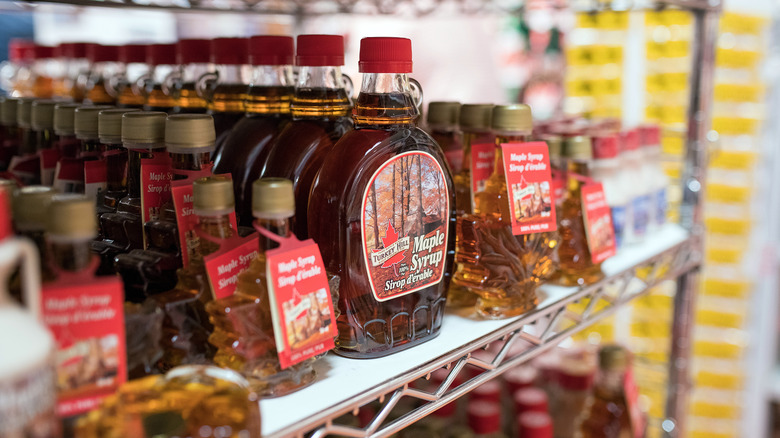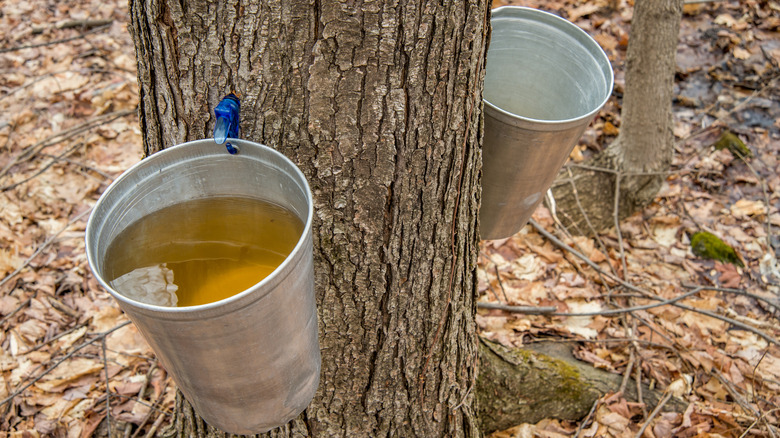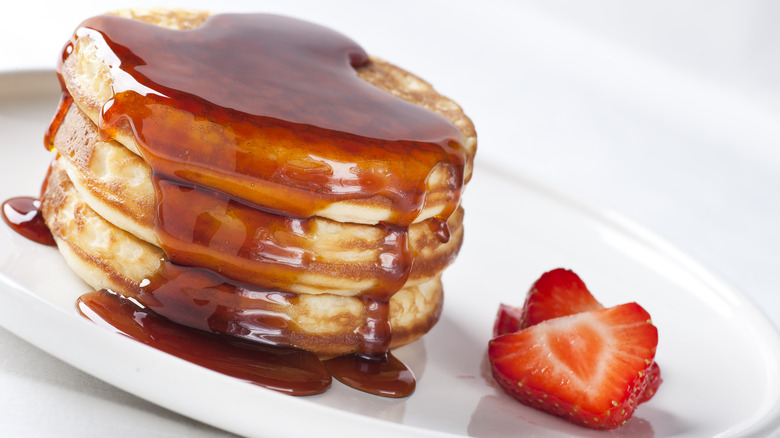The Surprising Reason There May Be A Maple Syrup Shortage In The Future
On June 13, NPR raised the alarm. The United States may see its maple syrup stock dwindle, leaving pancakes, plates of French toast, and other diner classics across the country naked.
The drop in supply is due to the thriving species of earthworm commonly known as either crazy worms or Asian jumping worms. In April, Smithsonian Magazine reported that these worms had spread throughout 15 of America's middle states, ranging from Texas to Minnesota and Missouri to Ohio. By June, Gary Fish, the state of Maine's horticulturist, warned Maine Public Radio that the worms had spread to the most northeastern territory in the country.
Fish explained that, despite their reputation as garden helpers, which earthworms have enjoyed due to the benefits European worms can bring to the soil of Maine, these worms are dangerous. Unlike the European earthworm, which can help plants by burrowing deeper into the soil and channeling rainwater towards their roots, the Asian worm remains near the surface, eating everything. This affects maple trees by removing a protective layer for their shallow roots, causing stress and opening them up to infection.
Furthermore, as Josef Görres, a soil scientist at the University of Vermont, added for NPR, the lack of the duff layer means deer will begin to scavenge on sapling maple trees instead, exacerbating the adult population's decline due to the worm's immediate effects by killing off the maturing ones.
Taken together, Görres gives a speculative forecast of syrup decreasing over the next century.
Maple trees are at risk for more than worms
While the worry over invasive jumping worms is warranted, they only represent the latest threat to the production of maple syrup. The other, of course, is the broader collapse of the environment.
In June, MSN shared a report from WPTZ, a local news station serving northern parts of New York and Vermont's Champlain Valley, that covered the fact that Vermont once again was the country's leading producer in maple syrup despite the overall 21% drop in its production. "Folks were anywhere from 50 to 75% of a normal crop across the board this season," Allison Hope, the executive director of the Vermont Maple Sugar Makers Association, said, giving a more granular view.
The decline in maple syrup production has an established relationship with the warmer winters of recent years. Treehugger reported on a 2018 study connecting the lack of seasonal snow coverage in which maple trees evolved with a 40% slowing of growth and an inability to deal with the snowpack when it returns to more normal levels. While the possibility that the trees could readjust to the returned normalcy over the course of years remains open, the future of the industry is bleak as the conditions of its operation rely in part on such an open question. If the worms do not finish the maple trees off by reducing their soil to something utterly foreign, the changes in snowfall will and, with them, our precious syrup covered pancakes.
There's still some hope for diner goers everywhere
However, in May, Science Friday reported on news that researchers in New Hampshire were studying ways to produce maple syrup from trees that are not maples, the idea being that an entire industry that relies on only one type of tree would not be able to weather blows of arboreal illness or climate change.
David Moore, researcher at the University of New Hampshire, sees the American beech as a possible supplement. This research follows Moore's economic activity The Crooked Chimney, which sold beech, birch, hophornbeam, sycamore, and walnut syrup before Moore decided to pursue a graduate degree in 2015. Moore's studies, as the University of New Hampshire explained in a 2019 profile, consist of developing syrup making techniques and understanding the different conditions that promote sweet syrups in other trees. Birch trees begin their production in the warmer weather at the end of maple season, which would lend itself to a warming climate. But their period is five weeks shorter. The idea's sound. Now we need the execution.
Beech syrup, in particular, is surging. The New York State government even passed legislation in March that set clear regulatory framework for the product, especially in terms of advertising. Now, if you buy beech syrup in New York state, it will, as Sen. Michelle Hinchey said in the press release, contain one thing: "Real beech syrup has one simple ingredient — pure sap from the beech tree." Maple syrup may struggle, but the industry could still survive.


